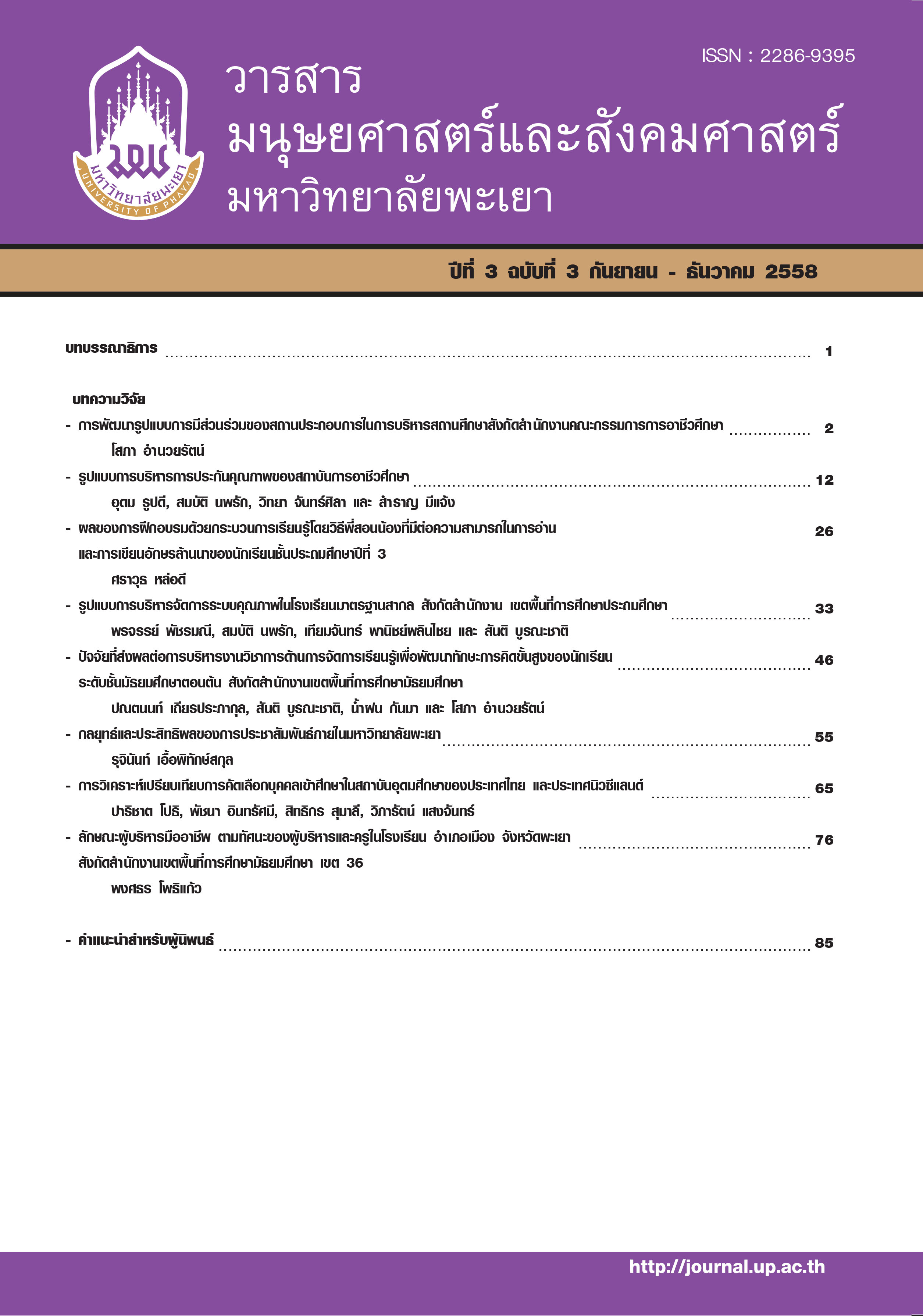The Quality System Management Model in World-Class Standard Schools for the Primary Educational Service Area Office
Keywords:
Model, Quality management, World-Class Standard School, Primary EducationAbstract
The objective of this research was to develop the quality system management model in world-class standard schools for the primary educational service area office with the following sub-objectives : 1) To study the actual situations problems and the ways of the quality system management in world-class standard schools for the primary educational service area office 2) To construct the quality system management model in world-class standard schools for the primary educational service area office and 3) To evaluate the quality system management model in world-class standard schools for the primary educational service area office
The research procedure was performed in three steps : 1) analyzing and synthesizing relevant document research findings, concepts and the theories in administration, then questionnaires 238 were school administrators in world-class standard schools for the primary educational service area office, then interviewing 6 education experts. Data were analyzed through means, percentage and content analysis. 2) constructing of a tentative model, then checking its appropriateness through focus group discussion among 9 educational experts 3) evaluating the usefulness and feasibility by 50 were school administrators in world-class standard schools for the primary educational service area office : data were analyzed, using means and standard deviations.
The results of the research were as follows :
- The quality system management in world-class standard schools for the primary educational service area office; inputs process results and environment.
- The quality system management model in world-class standard schools for the primary educational service area office has been abbreviated to “PIE MODEL” consists of four main components and three conditions for achievements ; 1) inputs with personnel and school administrations 2) process consists of 3 steps; step 1. planning with leadership and strategic; step 2 implementation with student and stakeholder focus, faculty and staff focus and process management; step 3 evaluation with measurement analysis and analysis and knowledge management and performance result 3) results consists of outputs with quality of learners and out comes with the satisfaction of teachers, students, parents and communities. 4) Environment includes factors contributing and factors that hinder management. Conditions for achievements; 1) policies of the quality management in world-class standard schools and 2) the ability of personnel 3) supervision, evaluation and management. 3) The evaluation of the constructed model yielded the results as useful at a high level and high feasible.
References
วราภรณ์ สีหนาท. รูปแบบรายงานรายเขต รอบที่ 1 (Semi-Annual Report) เขตตรวจราชการที่ 4 โครงการยกระดับคุณภาพมาตรฐานสากล. ได้จาก : http://www.inspect6.moe.go.th. วันที่เมษายน 2555.
สำนักงานคณะกรรมการการศึกษาขั้นพื้นฐาน. แนวการจัดการเรียนการสอนในโรงเรียนมาตรฐานสากล. กรุงเทพฯ : โรงพิมพ์ชุมนุมสหกรณ์การเกษตรแห่งประเทศไทย จำกัด; 2553 หน้า 10.
นงลักษณ์ เรืองทอง. การบริหารโรงเรียนที่มีประสิทธิผล. วิทยานิพนธ์ กศ.ด. มหาวิทยาลัยศิลปากร,นครปฐม; 2550 หน้า 7.
วิลัยพรณ์ เสรีวัฒน์. การประเมินเชิงระบบโครงการโรงเรียนมาตรฐานสากล. วิทยานิพนธ์ปริญญาปรัชญาดุษฎีบัณฑิต. มหาวิยาลัยขอนแก่น; หน้า 207.
สำนักงานคณะกรรมการการศึกษาขั้นพื้นฐาน. แนวทางการบริหารจัดการด้วยระบบคุณภาพTQA. กรุงเทพฯ : โรงพิมพ์ชุมนุมสหกรณ์การเกษตรแห่งประเทศไทย จำกัด; 2556 หน้า 31.
วิโรจน์ สารรัตนะ. ผู้บริหารโรงเรียน : สามมิติการพัฒนาวิชาชีพ สู่ความเป็นผู้บริหารที่มีประสิทธิผล. พิมพ์ครั้งที่ 6. ขอนแก่น. โรงพิมพ์คลังนานาวิทยา.2553.
มนต์นภัส มโนการณ์. การพัฒนารูปแบบการบริหารสถานศึกษาขั้นพื้นฐานบนพื้นที่สูงและทุรกันดาร. วิทยานิพนธ์ ก.ศด. มหาวิทยาลัยนเรศวร, พิษณุโลก; 2555 หน้า 182.
พิศาล สร้อยธุหร่ำ. แนวทางการบริหารโรงเรียนนิติบุคคลในกำกับของรัฐ : กรณีโรงเรียนมหิดลวิทยานุสรณ์ (องค์กรมหาชน). สำนักงานเลขาธิการสภาการศึกษา, กรุงเทพฯ; 2551 หน้า ค.
โรงเรียนสารวิทยา. รายงานผลการพัฒนาโรงเรียนมาตรฐานสากล. โรงเรียนสารวิทยากรุงเทพมหานคร. ได้จาก :http://www.kroobannok.com, วันที่ 25 เมษายน 2555.
Thomas J. Sergiovanni. The Principalship : A reflective practice perspective, 2nd ed. (NeedhamHeights, MA : allyn and Bacon); 1991 p. 76.
G.E. Austin, and D. Reynolds. Managing for Improved School Effectiveness : AnInternational survey School Organization.10, 2/3 ; 1990 p. 151-153.
Fred C.Lunenburg and Allan C.Ornstein. Educational Administration : Concepts and Practices (5thed). New York : Wedsworth Publishing, 2007 p 17-20.
Stufflebeam, D.L.. & Madaus, G.F. Program evaluation : a historical overview. In D.L. Stuffleam, G.F.Madaus & T.Kellaghan (Eds). Evaluation Models. 2nded. Netherlands : Springer. pp.3-18.
Downloads
Published
How to Cite
Issue
Section
License
ผู้นิพนธ์ต้องรับผิดชอบข้อความในบทนิพนธ์ของตน มหาวิทยาลัยพะเยาไม่จำเป็นต้องเห็นด้วยกับบทความที่ตีพิมพ์เสมอไป ผู้สนใจสามารถคัดลอก และนำไปใช้ได้ แต่จะต้องขออนุมัติเจ้าของ และได้รับการอนุมัติเป็นลายลักษณ์อักษรก่อน พร้อมกับมีการอ้างอิงและกล่าวคำขอบคุณให้ถูกต้องด้วย
The authors are themselves responsible for their contents. Signed articles may not always reflect the opinion of University of Phayao. The articles can be reproduced and reprinted, provided that permission is given by the authors and acknowledgement must be given.








